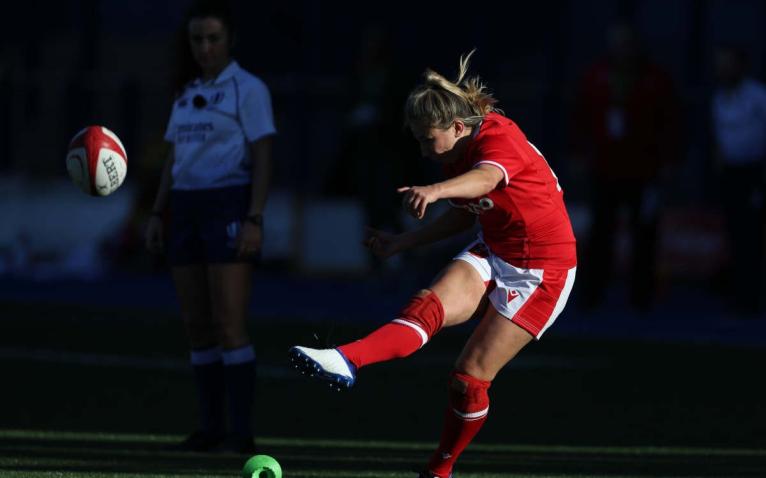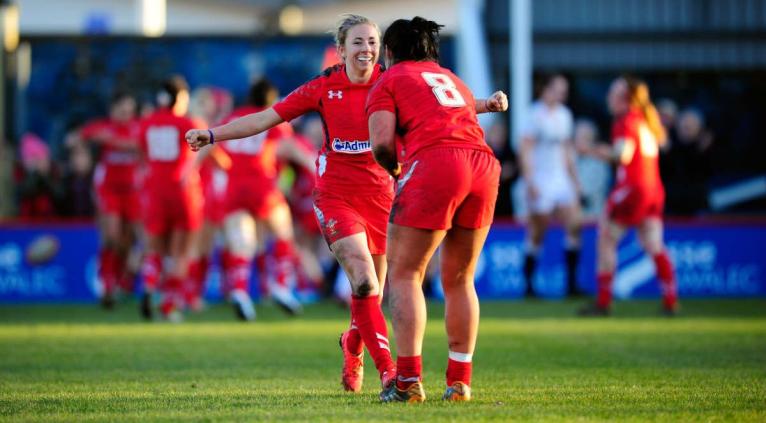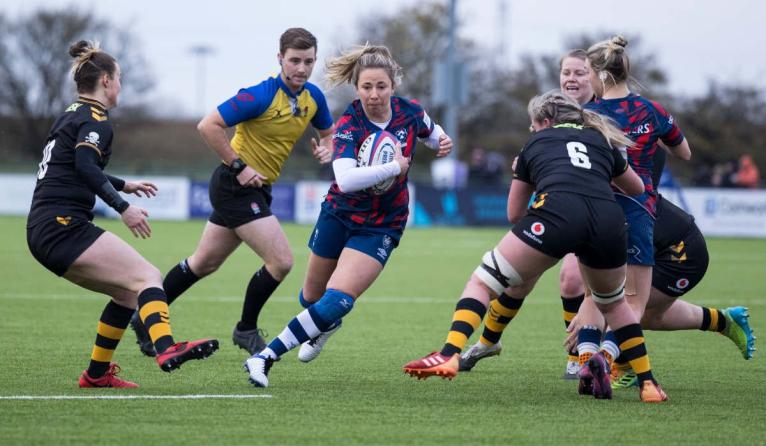Elinor Snowsill: 'There were so many times when I thought, I don't know if I can carry on'.

There were countless times when Elinor Snowsill, Wales’ veteran fly-half, felt like packing it all in. In the colds of winter, she’d raise her eyes to the heavens and grit her teeth, or out of view, shed a tear, as the demands of playing at a professional standard with amateur-level support constantly sapped her will.
Now, however, at her fourth World Cup, Snowsill has seen a sea change in the game in a short period, and at 33, can afford a wry smile, seeing girls a decade younger with professional contracts looking to a brighter future, where juggling multiple jobs isn’t a necessity, but a choice.
On Sunday in Whangerei, the Welsh squad will play in the defining pool Group stage against Scotland. The result will likely determine whether either side progresses into the knock-out stages, with hosts New Zealand and a rapidly improving Australia side jostling for ascendency in the same group. Snowsill, who will orchestrate Wales’ improving backline, needs few reminders of how important that opening encounter is. “Everything is riding on that first game against Scotland. All our preparation is geared towards Sunday and it is a must-win game. We have to make sure we’re in the right frame of mind.”
As a psychology graduate from Loughborough University, Snowsill knows mental preparation is just as important as the physical demands asked of them over the last few months. She knows team sport is ultimately about relationships and managing people. “When I tell people what I studied, they’ll say, ‘oh, so you can read minds?’, but it’s not that, it’s making you aware of that interpersonal communication and relationships. The best coaches are the ones who understand people and make them feel safe and secure.”
With a few years left of her career, Snowsill will, in time, look to utilise her education, and has her sights on moving into coaching. “Coaching appeals to me 100 per cent. Ever since I was a 20 or 21-year-old, I’d always have two heads; one for playing, and the other thinking, ‘when I’m a coach, I’m going to do this or not going to do that’. At every juncture, I’ve tried to pick up as much as I can. I’d love to be a performance coach further down the line.”
With a creditable Six Nations, where they registered wins over Scotland and Ireland, an instant upturn in performances, weeks after the first professional contracts were confirmed, Snowsill has been impressed with Ioan Cunningham’s impact on the squad. “I love working with Ioan (Cunningham), he’s a real people person. He knows how to manage people and get the best out of them. As a personality, he’s calm but he also demands and expects high standards. That’s what you want as a player.”

The Wales Women can look forward to a bright future, and yet Snowsill still has the mental scars from a career played pretty much exclusively as an amateur. “There have been some huge changes. Everything, in terms of the support at training, the standards, the levels of physicality in the game, has changed irrevocably in the last decade and a half. It’s a world apart from when I started.”
At her first World Cup in 2010 World Cup, Snowsill was still in university and would drive hours to be back for Wednesday night training and draining weekend camps. “We’d train until late Sunday afternoon and then head back into uni exhausted – some were even travelling from Scotland. Contact training was limited and it was not easy to compete.”
The difference, when compared with 2022, is marked. Having stepped down from her role with the charity School of Hard Knocks, to go full-time, Snowsill is finally acting out the career she never thought she’d have. “Now and we’re in four days a week, 8-4pm and we have loads of support. Our nutritionist lays on the food. We get supplements and access to a superb analysis department. We’re also getting a lot more support from the media and the public.”
You do it because you don’t know any different and there is no other option. You do it for the love and the honour of representing your country. You do it because want to be the best you can be.
Snowsill delivers this uplifting update with a beaming smile and a small sense of wonder. The wonder that full professionalism may never have happened in her playing career. “There were so many times when I thought, I just don’t know if I can carry on. Multiple times when I was going to give it all up. After the 2010 World Cup, I was going to pack it in because I was being played at full-back, when I wanted to be a No 10. Later down the line, I had times I just couldn’t juggle everything. It was taking a toll on me mentally and physically, juggling two careers.”
Despite the doubts, drudgery and hardship, Snowsill kept going. She kept plugging away for brighter days ahead. “You do it because you don’t know any different and there is no other option. You play internationally for free. You do it for the love and the honour of representing your country. You do it because want to be the best you can be, and because there’s always that nagging thought at the back of your mind that says, ‘what if it gets better?’ Saying that, without the support of my mum and dad, I’m not sure I’d have carried on. I owe them everything.”

Bright and articulate, Snowsill is an intelligent advocate for the growth of the women’s game, and she hopes the World Cup will be a springboard to further visibility in what is a crowded sporting landscape, with England’s footballers setting a high bar. “The win by the Lionnesses was absolutely phenomenal. Everyone got caught up in the hype of it. To me, it wasn’t women’s football, or international football, it was just football. One of my old school friends was moaning that she couldn’t get away from it, that it was ‘typical England…that’s all she ever sees on the box’. The differentiator was that she wasn’t moaning because it was women, she was moaning as if it was the men’s game. That’s the shift in perspective we’re witnessing. People are treating it as sport and not ‘it’s women’s sport, so therefore second-best’.
Snowsill says the organisers took a bold but groundbreaking step by taking out the ‘Women’ from the World Cup. “It’s all in the language. The fact they’ve said it’s the World Cup and not the Women’s World Cup is a huge step forward because when people see the TV listings and ‘Rugby World Cup’. People who aren’t massively into rugby and just want to watch a bit of sport will put it on and realise it’s women. Of course, some will switch over, but some will get hooked and all of a sudden you’ve got new fans. It’s important we don’t just try and emulate the men because there is stuff about men’s sport where they have made missteps. We should consciously take the path we want to go, not follow others.”
I love my life at the Bears. Since we moved into the high-performance centre, I’ve seen a huge shift in us being accepted into the environment. There is real parity between the men and the women.
The hype around the tournament has already gone up a notch compared to 2017, with high-profile players fronting their own podcasts, commentating and registering top billing in media circles. “I think girls like Scaz and Nolli deserve everything they get. They’ve been at the elite end of the game for so long. Rugby needs exposure and we 100 per cent need to sell the personalities of the game more. In the women’s game we have doctors, physios, military personnel, teachers and mothers – people who have had so many life experiences. That appeals to sports-mad audiences.”

Now happily ensconced in the progressive Bristol Bears set-up, one imagines Snowsill hanging out with ballers Ellis Genge, Semi Radradra and Charles Piutau on a regular basis, and refreshingly, it’s not too wide of the mark. “I love my life at the Bears. Since we moved into the high-performance centre, I’ve seen a huge shift in us being accepted into the environment. There is real parity between the men and the women. Whatever they get, we get, in terms of food, facilities, training in the same gym and on the pitches. For example, if I ask to have an extra kicking session, I can pitch up and kick with Harry Randall. As internationals, we are invited into any men’s meetings. There are no barriers. There’s no, ‘you have to train on the inferior pitch next door’. As a female programme, it’s one of, if not the best in the world in terms of full 360 support.”
Snowsill, whose parents live in Radyr, is a Welsh-speaker, and was educated at Ysgol Gyfun Plasmawr in Cardiff, is proud to wear the three feathers and appreciative of the camaraderie and support shown by the senior Welsh men’s internationals. “Because of the calendar, there isn’t that much crossover at the Six Nations or World Cup, but before we flew out, I saw Dan Biggar while we were training and had a good chat. Earlier in the year, Alun Wyn Jones came in to speak to us when we first got our contracts to chat about what to expect and how things might change for us. Having the backing of the Welsh boys makes a huge difference.”
You see in New Zealand, Dan Carter in kicking with the Black Ferns, and there’s other big names vocally supporting their women’s team on social media. We need those advocates in the game.
The 66-cap 10 insists she has no issue with using the massive platform afforded by the men to grow the women’s game. “You see in New Zealand, Dan Carter in kicking with the Black Ferns, and there’s other big names vocally supporting their women’s team on social media. Some will say we don’t need validation, but in my opinion, if their platforms raise awareness or convert just 10 per cent of their audience then it makes a difference. Superstars like Brian O’Driscoll have a million followers. We need those advocates in the game.”
What Snowsill now hopes, is to be able to shepherd the next generation of Welsh players around the park, and she says there are a few players set to thrive on the grandest stage. “We have some great young girls coming through. In our front row we have Gwenllian Pyrs. She’s been on fire in pre-season and been pivotal to our set-piece, and I think we’ll see a lot more around the park from her. In the back row, Alisha Butcher has been outstanding all season while Alex Callender has been putting her hand up playing her career-best rugby. In the backline Niamh Terry is such a natural and she looks like she has time on the ball. I’m expecting big things.”
The Welsh public will be glued to their TVs on Sunday, urging Snowsill and the squad, to etch their own names in rugby folklore. The far-fetched dream is becoming a reality.












